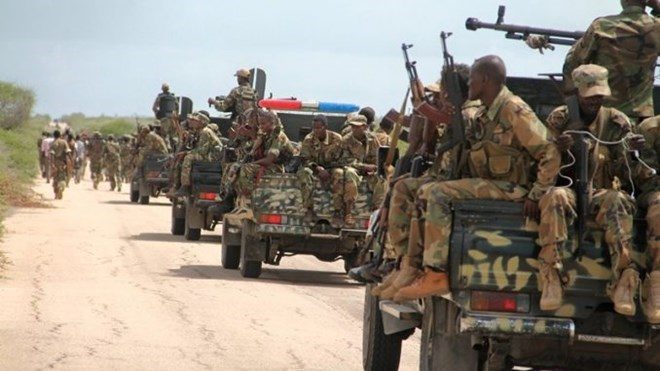The averting war in Northern Somalia

BY ICG
A dispute between Puntland and Somaliland over the contested areas of Sool and Sanaag risks escalating into open war. The UN, supported by states with influence on the two sides, should renew diplomatic.
Since 1998 Somaliland and Puntland have vied for control of the Sool and Sanaag regions, together comprising a neck of land stretching from the Gulf of Aden to the Ethiopian border. Thus far, 2018 has been an exceptionally violent year in this contest, with about twenty armed clashes recorded since January. A battle on 8 January saw Somaliland forces overrun Tukaraq, a town held by a small Puntland force, straddling a major highway and trade corridor that links Sool and Sanaag to eastern Ethiopia. The fighting left dozens of soldiers dead on both sides. The capture of Tukaraq, which coincided with an extensive tour of Puntland by Somali federal government President Mohamed Abdullahi Mohamed “Farmajo”, was seen as a warning from Somaliland to the Somali government against getting involved in the contested areas. On 15 May, tensions again spiralled into violence. A militia loyal to Puntland launched an attack on Somaliland army positions around Tukaraq. This time, intense fighting reportedly killed close to a hundred combatants, including fighters from both sides, making it the deadliest confrontation the conflict has yet seen.
The loss of Tukaraq in January and the heavy casualties incurred since have gone down badly in Puntland. Politicians and the public have directed recriminations not only at the Somaliland government in Hargeisa but against the administration of Puntland President Abdiweli Gas. The president is under increasing pressure to act, especially given elections later this year that he hopes to win. The recapture of Tukaraq appears to be a priority. During the first weeks of June, Gas has chaired a series of meetings to mobilise support for an offensive; during the latest, he delivered an address to the state parliament in which he vowed to “liberate” all areas “occupied” by Somaliland. By ratcheting up such expectations, the president is taking a huge gamble. In the short term, he gains political capital, especially as the public mood hardens against Hargeisa. But a failed offensive would risk a serious backlash that could doom his re-election prospects.
If Gas’s rhetoric is increasingly bellicose, so, too, is that of Somaliland leader Muse Bihi, who said: “If they want war we are ready. I will teach them the lesson that I taught [Siad Barre]”.
Indeed, the two sides’ public statements suggest both are confident in a quick military win. They are likely miscalculating. Their militaries are almost equally matched in combat strength, equipment and experience so risk getting bogged down in a protracted conflict with enormous costs (perhaps Somaliland has a slight edge but unlikely enough of one for a decisive victory). Prolonged fighting would likely trigger mass displacement, compounding what has long been a humanitarian emergency in Somalia. Such a war would sow new instability in the region, exacerbate inter- and intra-clan frictions and perhaps allow jihadists active in remote coastal and mountain enclaves the opportunity to recruit and extend their reach.
Puntland is particularly vulnerable to upheaval in the event of a lengthy war with Somaliland. Its forces are overstretched, fighting low-level but costly local insurgencies in the Galgala mountains along the northern coast; securing restive frontiers around Galkayo, south of Puntland in Somalia’s north-central region; and policing towns periodically targeted by a local ISIS branch and Al-Shabaab. War with Somaliland would force it to fight on multiple fronts, particularly because its rival potentially could stoke existing conflicts in an attempt to further sap Puntland’s military resources.
For its part, Somaliland also has struggled to contain pockets of discontent in recent years. President Bihi’s administration has faced a recurrent inter-clan conflict in Ceel Afweyn, in Sanaag region, that pits two major branches of the Isaq clan – Bicido/Habar Jeclo and Saad Yonis/Habar Yonis – against each other. The conflict’s roots lie in a long-running Habar Jeclo versus Habar Yonis feud that intensified during the 2017 election, which Bihi, backed by a Habar Jeclo-led alliance, won. That election increased regional and sub-clan rivalries, with much of the opposition to the Bihi administration now concentrated in the east, especially in Burco, Somaliland’s second largest city. Such local opposition to Hargeisa could expand into more serious political instability were the conflict with Puntland to escalate.
For Somaliland a conflict with Puntland also could tarnish its hard-won regional and international reputation as a stable and well-run polity. The crucial donor support upon which Somaliland relies for its development is predicated not only on sustained progress in governance, but also on its restraint in and peaceful resolution of conflicts. A war over Sool and Sanaag risks eroding Somaliland’s standing abroad.